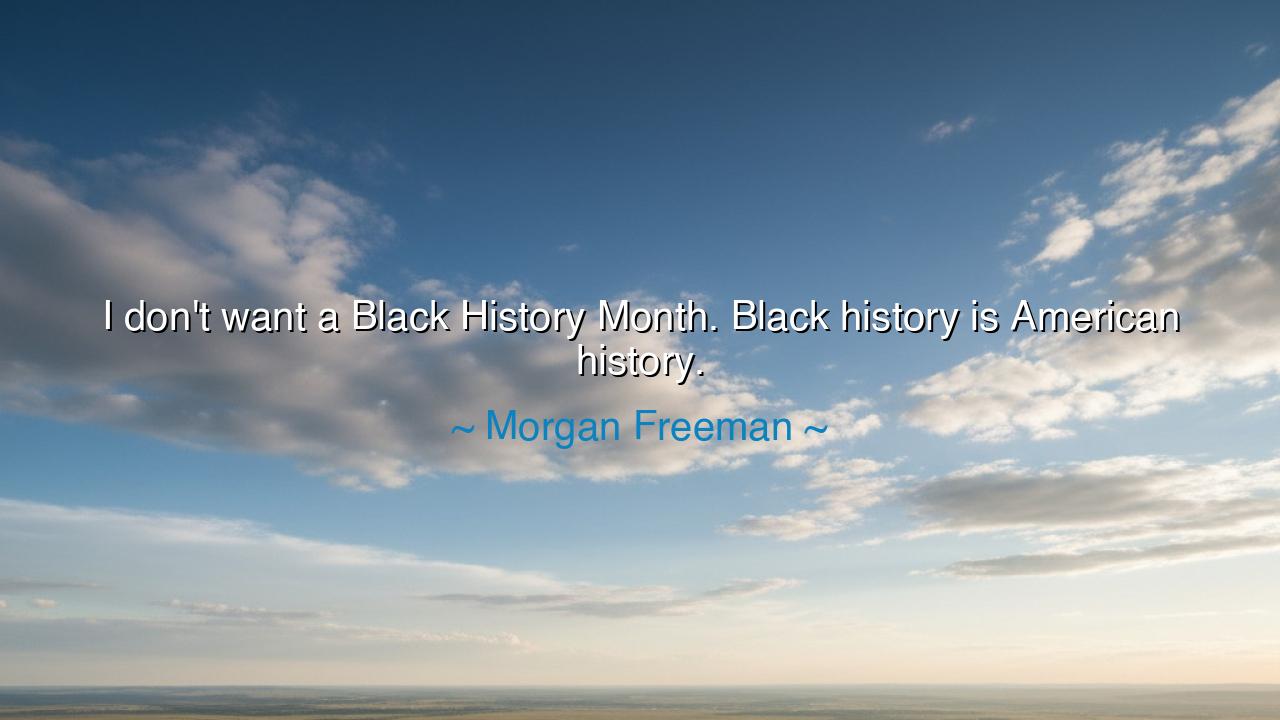
I don't want a Black History Month. Black history is American






Hearken, O children of the land, and attend the words of Morgan Freeman, who spoke with the quiet force of truth: “I don’t want a Black History Month. Black history is American history.” In this utterance lies a profound call to unity, a reminder that the tapestry of a nation is woven from every thread, that the stories of one people are inseparable from the story of all. Freeman speaks not against recognition, but against segregation of memory, urging us to see the full expanse of history as a shared inheritance, a reflection of the struggles, triumphs, and resilience of all who dwell upon this soil.
History is too often parceled into compartments, celebrated in fragments, while the greater truth—the essence of human endeavor—goes unheeded. Freeman’s words remind us that the contributions of Black Americans are not auxiliary, not optional footnotes, but central to the narrative of a nation forged in freedom, strife, and aspiration. From the fields of cotton to the halls of Congress, from the brilliance of inventors like George Washington Carver to the eloquence of leaders like Martin Luther King Jr., Black Americans have shaped the destiny of the land. Their history is inseparable from American history, a truth that cannot be diminished by calendars or ceremonies.
Consider the example of the Underground Railroad, a network of courage and defiance that helped countless enslaved souls find freedom. Here were not only the stories of those fleeing bondage but also the allies who aided them, the communities that resisted oppression. This was a chapter of American history written in courage, sacrifice, and solidarity. To isolate it as “Black history” alone is to diminish its power as a testament to the nation’s struggle for justice and liberty, for the liberation of one was inextricably tied to the moral awakening of all.
Freeman’s words also speak to the moral imagination of a people. When we see history as unified, we acknowledge that oppression and heroism touch all lives. The achievements of Barack Obama as the first Black president are not only triumphs for Black Americans—they are triumphs for the nation, for the ideals of democracy and progress. Likewise, the civil rights movement was not the story of a single community alone; it was a struggle for the soul of a nation, echoing the ancient truths of justice and the moral arc of history bending toward righteousness.
There is a practical teaching in this truth: to understand a nation fully, we must resist the temptation to segregate its history. Study the contributions of all peoples, recognize the intertwined paths of triumph and tragedy, and cultivate a consciousness that sees unity in diversity. The lessons of courage, resilience, and ingenuity are not confined to one month, one community, or one narrative—they are the inheritance of every citizen, every generation, every heart that beats in the pursuit of justice.
Morgan Freeman’s declaration is also a caution: to divide history by color or category is to obscure the shared humanity that binds us. It risks creating a vision of the past that is incomplete, of a people that is fractionalized. True understanding demands that we weave together every story, acknowledging both the darkness endured and the brilliance achieved. In doing so, we honor not only those who came before but also the generations yet unborn, who will inherit a nation enriched by truth and memory alike.
In the end, Freeman’s words are a summons to action as well as reflection. Celebrate, remember, and honor the contributions of all peoples—not as isolated footnotes, but as the lifeblood of the nation. Let Black history shine within the broader constellation of American history, inseparable and luminous. Every act of learning, teaching, and sharing this truth is an act of justice, a step toward a nation that remembers itself fully and rightly.
Thus, remember: the story of one is the story of all. Do not confine valor, genius, or struggle to a calendar; let it live in every lesson, every classroom, every conversation. Embrace history in its totality, and in doing so, honor the unity, courage, and enduring spirit of a people whose legacy is the legacy of the nation itself. Black history is American history—inseparable, eternal, and worthy of our deepest reflection.
If you wish, I can also craft a more vivid, story-driven audio version, weaving in specific lives, speeches, and achievements to make Freeman’s point come alive in a deeply evocative narrative. Do you want me to do that next?






AAdministratorAdministrator
Welcome, honored guests. Please leave a comment, we will respond soon